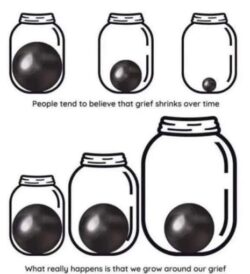 In the midst of navigating the consecutive deaths of several people in my life over the past few months, the topic of navigating grief and loss has been at the forefront of my mind. There are very few human experiences that are near certainties for every person on the planet. We all live such unique and inimitable lives; grief and loss, however, are universal experiences. Except for those who die when they are very, very young, all of us will go through the grief process at some point in our lives, and most of us will have to navigate these waters many times.
In the midst of navigating the consecutive deaths of several people in my life over the past few months, the topic of navigating grief and loss has been at the forefront of my mind. There are very few human experiences that are near certainties for every person on the planet. We all live such unique and inimitable lives; grief and loss, however, are universal experiences. Except for those who die when they are very, very young, all of us will go through the grief process at some point in our lives, and most of us will have to navigate these waters many times.
Different sources offer varying definitions and breakdowns of the stages of grief. One of the most widely accepted is Elisabeth Kubler-Ross’s 5 Stages of Grief, which breaks the process down into five steps that may occur individually or overlapping, and sometimes even with regressions to stages that have already been experienced.
The Kubler-Ross 5 Stages of Grief
- Denial and Isolation
- Anger
- Bargaining
- Depression
- Acceptance
When we first learn of the death of someone we love, denial is a normal response. Sometimes, the denial is quite literal, with refusal to believe that it’s true, demanding to see the body, or arguing that it must be a case of mistaken identity. More often, the denial takes the form of a sort of shock. We feel numb, not sad, and might on occasion actually forget that the person is dead and make reference to the next time we’ll see them or we’ll think to ourselves that we need to call them or send them an email before remembering that they’re gone.
Anger can be directed at many sources. We might be angry at God, the person who died, someone who was involved in the death if it was an accident or crime, and even at ourselves because we didn’t call them when we said we would, or perhaps because they committed suicide and we feel that we weren’t as diligent as we could have been.
Bargaining is the process through which we rehash all of the things  that could have been done differently. By hyper-focusing on things that could have been done differently to change to outcome (death), we postpone focusing on the fact that someone we love has died and the feelings that accompany that reality. It is much easier to think about how things could have gone differently if we hadn’t let someone get in the car, had sought medical attention sooner, or if the person’s depression had been treated, than it is to focus on what is right in front of us.
that could have been done differently. By hyper-focusing on things that could have been done differently to change to outcome (death), we postpone focusing on the fact that someone we love has died and the feelings that accompany that reality. It is much easier to think about how things could have gone differently if we hadn’t let someone get in the car, had sought medical attention sooner, or if the person’s depression had been treated, than it is to focus on what is right in front of us.
Depression, the fourth stage of grief, manifests differently in different people. We may find ourselves crying nonstop, worrying and having anxiety attacks, feeling as though we can’t get out of bed, or stressing out about practicalities like funeral arrangements and expenses.
The last stage, acceptance, is not one that everyone reaches. By allowing ourselves to feel and experience the pain that comes with loss, we are more likely to get there in time. What we suppress tends to grow, so people who seem to be handling a death almost too well for it to be true may very well be those who will suffer the longest. If we force ourselves to carry on as though nothing has happened and we are fine, we can thwart our own healing.
One of the most important things you can do for yourself when  someone you love dies is to give yourself time to grieve. Many cultures have a set time period that is set aside for nothing but mourning when a loved one dies, but in our culture we are oftentimes expected to resume life as normal as quickly as possible, and this is seen as a sign of strength. Take time off work if you’re able. If not, find time each day to be with your feelings and acknowledge them. Accept emotional comfort and offers of practical help from the people who care about you. Share stories with other people who knew the deceased.
someone you love dies is to give yourself time to grieve. Many cultures have a set time period that is set aside for nothing but mourning when a loved one dies, but in our culture we are oftentimes expected to resume life as normal as quickly as possible, and this is seen as a sign of strength. Take time off work if you’re able. If not, find time each day to be with your feelings and acknowledge them. Accept emotional comfort and offers of practical help from the people who care about you. Share stories with other people who knew the deceased.
Grief is neither convenient nor practical. It is, however, normal and healthy. Be gentle with yourself, and don’t expect too much too soon. If your house gets messy because you haven’t had the energy to clean, or you cry in the grocery store, you’re not weak or pathetic. You’re simply a grieving human being. Everyone you encounter either has been or will be at some point, so there is no reason to be ashamed. While no one can know exactly what we are going through (which is why placations of, “I understand” aren’t comforting), we can all empathize and support each other in healing.
Devon is a Licensed Mental Health/Substance Abuse Counselor, Personal Life Coach, Certified Personal Trainer, and a nationally certified teacher. She is committed to helping young people be their highest selves in all areas: body, mind, and spirit. Her expertise, enthusiasm, energy and educational background serve to create a unique blend of services and techniques employed to help you reach your goals. For counseling sessions, coaching, or training, please contact her at 505.469.0779 or he***************@***il.com.



